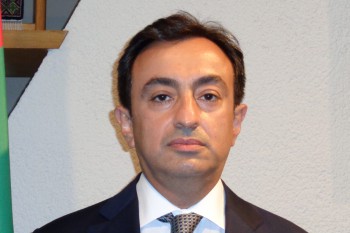Events

November 2020
H. E. Mr. Gursel Ismayilzada, Ambassador of the Republic of Azerbaijan
UPDATE: Nov 25, 2020
Strengthening relationships by export of agri-products, tourism, and SMEs’ investment
—– This time is your second mission as Ambassador to Japan. How would you view the development of the relations between Azerbaijan and Japan?
The two countries have established long-term partnership based on mutual trust and mutual benefit in political, economic, humanitarian, cultural areas, as well as dialogue in regional and international level. Since the establishment of diplomatic relations in 1992, these factors created favorable ground for our cooperation. Japanese companies are actively involved in our oil industry and have shares in the Caspian Sea oil field and oil pipeline. The Shimal Gas Combined Cycle Power Plant was realized by Japan’s ODA. Azerbaijani cargo carrier “Silk Way West” is successfully continuing its scheduled flights to Osaka and planning to expand the business in Japan. For transporting goods from Japan and the Pacific Ocean to the west, Azerbaijan has initiated joint use of the Baku Tbilisi Callus (BTK) Railway and the Trans-Siberian Transport Corridor. Mie Prefecture and H.I.S. signed a strategic cooperation agreement for the export of Japanese food products (Ise tea) to world markets through Azerbaijan using Trans-Caspian International Transport Route. Azerbaijan is facing landslide, and we are closely working with Japanese partners in natural disaster prevention.
—– What areas and fields are you focusing to deepen the cooperative relationship between the two countries?
It is important to expand exports of agricultural products such as pomegranate juice, wine and honey to Japan. The Government is promoting tourism, and we are looking forward to welcoming more Japanese tourists in our country. In addition, I would like to encourage Japanese SMEs to invest in industrial parks that offer attractive tax incentives. Azerbaijan has established many industrial parks specializing in chemicals, pharmaceuticals, textiles and recycling, and the Alat Free Economic Zone, including the new port of Baku, is currently under construction.
—– Azerbaijan seems to have succeeded in fighting corona infections. What kind of socio-economic measures have you taken?
In the fight against the coronavirus pandemic, the Government, under the leadership of President Ilham Aliyev presented a wide range of policy measures. They aim at ensuring availability of healthcare resources, limiting impact on critical services, alleviating the economic impact on people and companies. At the moment, we have about 40000 infection cases and 580 deaths. Testing and diagnosis of coronavirus infections is highly specialized in accordance with international practice. The support program (estimated 3,1 % of GDP) serves sustainable development goals, including the preservation of social balance and economic development in the post-pandemic period. Azerbaijan also contributed to the global response to COVID-19, including donation to the WHO, and urgent humanitarian aid to 29 affected countries.
—– Are there any prospects for a peaceful resolution of the prolonged Nagorno-Karabakh conflict with Armenia?
The roots of the conflict go back to 1988, when, Armenian separatist in the Nagorno-Karabakh region of Azerbaijan started irredentist claims about the unification of the region with Armenia. As a result of the Armenian aggression, 20% of the international recognized Azerbaijan’s territory, including the Nagorno-Karabakh and seven adjacent districts were occupied, and caused more than 30000 deaths, over one million refugees and internally displaced persons. The UN Security Council and other international organizations have consistently condemned the use of military force against Azerbaijan and demands unconditional withdraw of Armenian troops from occupied territories. Despite a ceasefire agreement signed in 1994, Armenia is repeatedly violating ceasefire, mostly targeting residential areas. On September 27, 2020 the armed forces of Armenia blatantly violating the ceasefire regime have launched another aggression against Azerbaijan, targeting of residential areas and the civilians. Five members of entire family were killed as a result of artillery shelling by the Armenian armed forces against the civilian population of Azerbaijan. The armed forces of the Republic of Azerbaijan are undertaking necessary counter-offensive measures to prevent Armenia’s another military aggression and ensure the security of the civilian population.
(Interview by Shu Tamaru, FEC Counsellor)